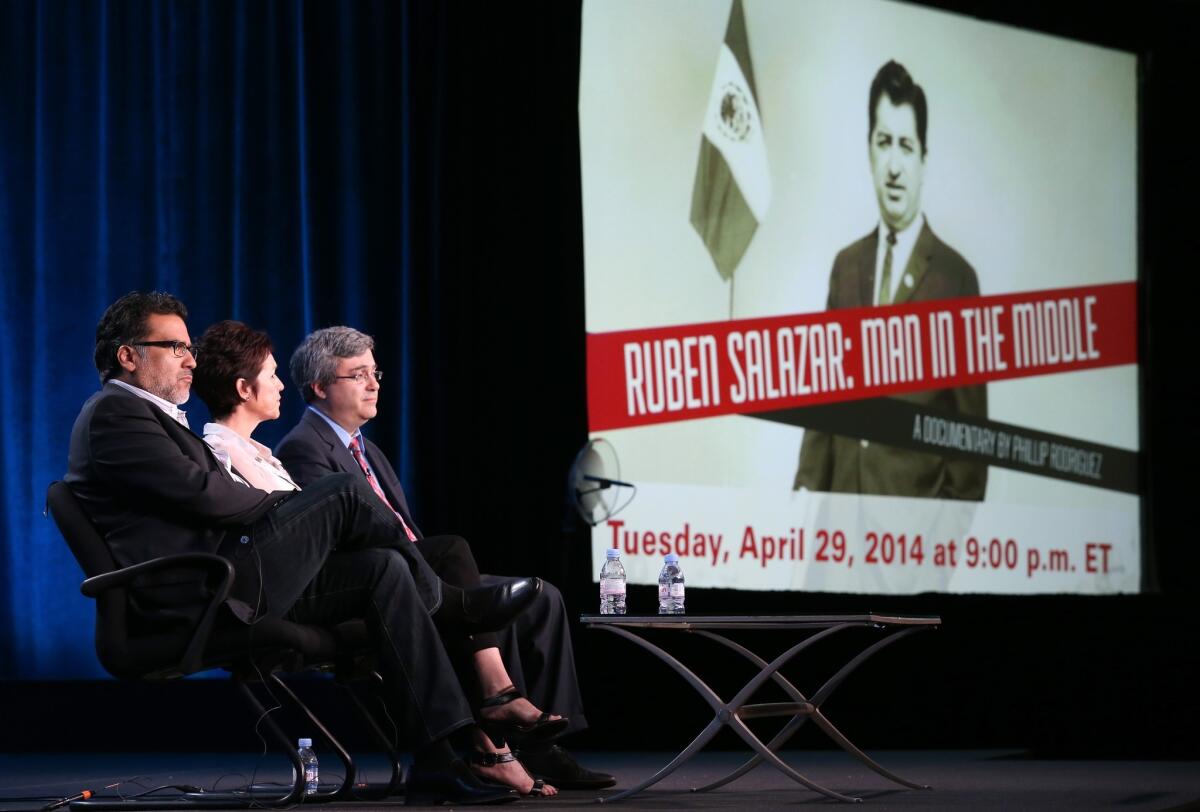TCA: Director of Ruben Salazar film talks about struggle to get files

Newly obtained police documents were pivotal in making the upcoming PBS documentary “Ruben Salazar: Man in the Middle,” which examines the life and controversial death in 1970 of the prominent Mexican American journalist, said filmmaker Phillip Rodriguez.
“Without that data, the film would be utterly incomplete,” said Rodriguez in an interview with The Times on Wednesday, the final day of the winter TV press tour in Pasadena. “We wouldn’t have been able to address the matter in a responsible way.”
The long-confidential documents, which provide additional details about Salazar’s death during a Chicano anti-war march in August 1970, did not come easily and only after pressure from activists, said Rodriguez, who directed the film and is one of its producers. The film is slated to air April 29.
PHOTOS: Faces to watch 2014 | TV
A spokesman for the Los Angeles County Sheriff’s Department disputed the view that the organization or Sheriff Lee Baca blocked access to the documents. “We made all the documents available for anyone to come down to review,” said Steve Whitmore. “Sheriff Baca did not deny anybody the right to review them.”
The unredacted files -- autopsy documents, investigative documents and coroner’s photos -- relating to Salazar’s death were released in late 2012. Rodriguez said that while they shed new light on the case, there was no “smoking gun.”
Salazar, a Times reporter and news director at Spanish-language KMEX-TV, had sought refuge in a bar after rioting broke out during a massive anti-Vietnam War demonstration in East Los Angeles. The 42-year-old award-winning journalist was killed when a sheriff’s deputy shot a tear gas missile into the bar.
BEST TV OF 2013 Lloyd | McNamara
The killing was blamed on tactical mistakes by deputies, but others have suggested Salazar was deliberately targeted for his aggressive coverage of civil rights issues, including police misconduct.
Salazar’s death became a rallying point in the Mexican American civil rights movement. The journalist became an iconic figure with parks, schools, scholarships and even a U.S. postage stamp in his honor.
The one-hour documentary features interviews with some of Salazar’s family, friends and former co-workers at The Times and KMEX-TV. The film also features some of Salazar’s private writings from his personal journals, provided by his daughter Stephanie Salazar Cook.
WINTER TV PREVIEW: Full coverage of the season’s shows
“You wonder would he have wanted that, to expose his feelings and thoughts,” Cook said during the morning panel. “But I think because of the fact that he was a journalist and had a journal, I think he would have wanted people to know who he was instead of who they thought he was.”
Rodriguez told The Times that a member of the Sheriff’s Department -- Chief Jim Lopez -- has seen the film, but Baca has not.
“We haven’t shown it to Baca,” he said. “We haven’t invited him yet. I’d be interested to see what he has to say about it, though.”
ALSO:
Slain Times reporter Ruben Salazar examined in new PBS documentary
‘Parenthood’ boss Jason Katims talks Joel/Julia, new NBC comedy ‘About a Boy’
‘Good Day L.A.’ reporter Julie Chang returns after brain surgery to remove tumor
More to Read
The complete guide to home viewing
Get Screen Gab for everything about the TV shows and streaming movies everyone’s talking about.
You may occasionally receive promotional content from the Los Angeles Times.






